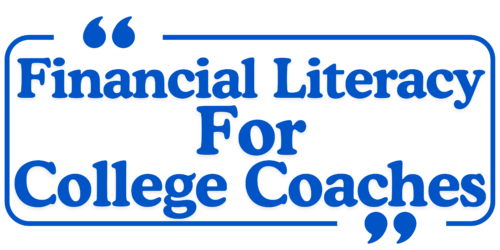Curriculum: Deferred Compensation Literacy for Coaches
This curriculum is designed to provide coaches with a comprehensive understanding of deferred compensation, its benefits, and how to effectively manage it as part of their overall financial strategy. Coaches will learn how deferred compensation can enhance their financial planning, particularly in relation to retirement and tax planning.
Module 1: Introduction to Deferred Compensation
Learning Objectives:
- Define deferred compensation and its significance for coaches.
- Understand the different types of deferred compensation plans.
- Recognize the potential benefits and risks associated with deferred compensation.
Topics Covered:
- What is Deferred Compensation? Key Concepts and Terminology
- Types of Deferred Compensation Plans: Qualified vs. Non-qualified
- Benefits of Deferred Compensation: Tax Advantages and Financial Planning
- Risks Involved: Employer Default, Investment Performance, and Access to Funds
Module 2: Types of Deferred Compensation Plans
Learning Objectives:
- Identify the various types of deferred compensation plans available.
- Understand the differences between qualified and non-qualified plans.
- Learn how each type of plan can fit into a coach’s financial strategy.
Topics Covered:
- Qualified Plans: 401(k), 403(b), and Pension Plans
- Non-qualified Plans: Executive Bonus Plans, SERPs, and Deferred Salary Agreements
- Comparison of Plan Features: Contribution Limits, Vesting, and Distribution Rules
- Evaluating Which Plan Works Best for You
Module 3: Tax Implications of Deferred Compensation
Learning Objectives:
- Understand how deferred compensation affects your tax situation.
- Learn about tax deferral benefits and how they work.
- Develop strategies for effective tax planning related to deferred compensation.
Topics Covered:
- How Deferred Compensation Affects Taxable Income
- Tax Deferral: When Taxes are Paid and Potential Tax Brackets
- Understanding FICA Taxes and Other Payroll Taxes
- Strategies for Minimizing Tax Liability in Retirement
Module 4: Contribution Strategies
Learning Objectives:
- Learn how to maximize contributions to deferred compensation plans.
- Understand the impact of contributions on overall financial goals.
- Develop a contribution strategy that aligns with personal and professional objectives.
Topics Covered:
- Contribution Limits: What You Need to Know
- Balancing Contributions with Other Financial Goals
- Impact of Market Conditions on Contribution Strategies
- Adjusting Contributions Over Time
Module 5: Investment Options within Deferred Compensation Plans
Learning Objectives:
- Understand the investment options available in deferred compensation plans.
- Learn how to assess risk tolerance and make informed investment choices.
- Develop a diversified investment strategy for deferred compensation funds.
Topics Covered:
- Types of Investment Options: Stocks, Bonds, Mutual Funds, and More
- Assessing Risk Tolerance: Determining Your Comfort Level
- Creating a Diversified Investment Portfolio
- Monitoring and Adjusting Your Investment Strategy
Module 6: Distributions and Withdrawal Strategies
Learning Objectives:
- Learn about the rules governing distributions from deferred compensation plans.
- Understand the implications of early withdrawals and penalties.
- Develop a strategy for taking distributions in retirement.
Topics Covered:
- Distribution Rules: Timing and Methods
- Early Withdrawal Penalties: What to Expect
- Tax Implications of Withdrawals: Planning for Retirement Income
- Strategies for Structuring Withdrawals to Minimize Taxes
Module 7: Integrating Deferred Compensation into Your Financial Plan
Learning Objectives:
- Understand how to incorporate deferred compensation into an overall financial strategy.
- Learn to balance deferred compensation with other retirement and investment accounts.
- Develop a holistic financial plan that considers current and future financial needs.
Topics Covered:
- Aligning Deferred Compensation with Financial Goals
- Evaluating Overall Retirement Strategy: How Deferred Compensation Fits In
- Coordinating with Other Retirement Accounts: 401(k), IRA, etc.
- Regularly Reviewing and Adjusting Your Financial Plan
Module 8: Legal Considerations and Best Practices
Learning Objectives:
- Understand the legal aspects of deferred compensation plans.
- Learn about regulatory requirements and compliance.
- Develop best practices for managing deferred compensation.
Topics Covered:
- Legal Framework: ERISA and Other Regulations
- Importance of Documentation and Record Keeping
- Best Practices for Managing Deferred Compensation
- Seeking Professional Guidance: When to Consult a Financial Advisor
Module 9: Case Studies and Real-Life Applications
Learning Objectives:
- Analyze real-life scenarios involving deferred compensation.
- Learn from the experiences of other coaches and professionals.
- Apply lessons learned to personal financial situations.
Topics Covered:
- Case Study Analysis: Successful Use of Deferred Compensation
- Lessons from Coaches: Common Mistakes and How to Avoid Them
- Group Discussions: Sharing Experiences and Strategies
- Applying Knowledge to Your Financial Situation
Module 10: Final Assessment and Action Plan
Final Assessment: Participants will create a personalized action plan that outlines their strategies for effectively managing deferred compensation.
Certification: Upon completion, participants will receive a certification in Deferred Compensation Literacy for Coaches, empowering them to make informed decisions regarding their deferred compensation plans and overall financial strategy.
This Deferred Compensation Literacy curriculum equips coaches with the necessary knowledge and tools to effectively manage their deferred compensation, enhancing their financial security and planning for a successful future.
